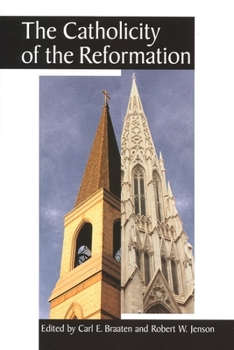The Catholicity of the Reformation
Select Format
Select Condition 
Book Overview
As the title of this learned collection of essays suggests, "catholicity" was the true intent of the Reformation. The Reformers did not set out to create what later came to be known as Protestant Christianity. Theirs was a quest for reformation and renewal in continuity with the "one holy catholic and apostolic church" of ancient times. This informed and informative book continues the appeal of previous voices that have pointed out the catholic intention of the Reformation -- such voices as those of Friedrich Heiler, Philip Schaff, and Paul Tillich, to name only a few -- and calls the heirs of the Reformation, both pastors and churches, to be faithful to the evangelical and catholic elements of the great Christian tradition. Contributors: Carl E. BraatenJames R. CrumleyGunther GassmannRobert W. JensonFrank C. SennRobert L. WilkenDavid S. Yeago
Format:Paperback
Language:English
ISBN:0802842208
ISBN13:9780802842206
Release Date:December 1996
Publisher:William B. Eerdmans Publishing Company
Length:112 Pages
Weight:0.42 lbs.
Dimensions:0.3" x 6.0" x 8.9"
Customer Reviews
2 ratings
Catholicity was the True Intent of the Reformation
Published by Thriftbooks.com User , 19 years ago
This work is short, but each chapter is quite informative. The book itself is a small collection of scholars (mostly Lutheran) such as Robert W. Jenson, David S. Yeago, Carl E. Braaten, Gunther Gassmann, Frank Senn, etc. Each chapter covers a specific topic ranging from The Authority of the Church, The Church as Community, the Catholic Luther, to The Reform of the Mass and Lutheran Pietism and Catholic Piety. The essential thrust of the work is to demonstrate that the Reformation was not meant to be a move away from the Catholic Church, nor a complete separation from the Catholic Church, but rather an attempt for the Catholic Church, at the time, to experience and evangelical awakening. Some of the better chapters include David Yeago's titled "The Catholic Luther." Yeago describes that Luther was certainly not intending to completely separate him and those who followed him from the Catholic Church. Rather, at a specific time in Luther's life (1518) Luther experienced a shift in thinking which ultimately led him to a desire to reform certain things within the Catholic Church. Yeago is very detailed in this chapter, using Luther's actual works to demonstrate this shift in thinking. Another excellent chapter in the work is Frank C. Senn's titled "The Reform of the Mass." Senn demonstrates how the Mass had changed within the Reformation and those years following the Reformation. Moreover, Senn discusses how certain men (i.e. Zwingli, Luther, Calvin, etc.) affected the Mass, and what changes were implemented by each man that led to what certain denominations do with the Mass today. Moreover, Senn discusses changes with the Mass which occurred prior to the Reformation. Overall, this small book is well worth every cent paid. It is quite detailed and well written for such a brief work, and is quite ecumenical in pleading for an evangelical catholicity. I recommend this work.
That All May Be One
Published by Thriftbooks.com User , 22 years ago
What form of Protestantism is to take the center stage in America? This book by a group of, all but one, Luthernas represents two distinct trends in American Protestantism. One group sees the Reformation as an end in itself, complete and finished. Free forms of worship, no institutionization of the Spirit, etc. This group sees there to be no need whatsoever to be reunited to Rome. That would be a step backward. The other group understands the movement differently. These beleivers understand themselves to be Catholics in exile, to varying degrees, who think that the Reformation may be doing more harm thatn good, even if it was, in Pelikan's words, "a tragic necessity". The authors are very fluent in teh terms of the questions at hand and represtent the main thinkers on the subject. Please consider the following statement by a late 19th century Lutheran: "One is not a Lutheran who every day does not ask himself why he is not a Roman Catholic."





